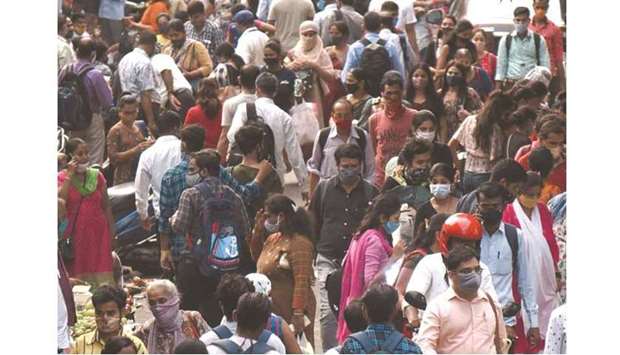Hundreds of thousands of devotees packed a religious festival yesterday as India overtook Brazil to become the country with the second-highest number of coronavirus (Covid-19) infections, bearing the brunt of a new Covid-19 wave battering South Asia.
The region – home to almost one-quarter of the world’s population – has been hit by soaring infection rates in recent weeks.
India reported a new daily record of nearly 170,000 cases yesterday to take the total to 13.5mn, above Brazil’s 13.48mn.
The milestone was reached as media said New Delhi would approve Russia’s Sputnik V vaccine for use after being recommended by an expert panel.
The expert panel of India’s drugs regulator recommended emergency use approval Sputnik V, two sources said yesterday, which could make it the nation’s third to be approved.
The panel of the Central Drugs Standard Control Organisation (CDSCO) recommended the authorisation, said two people familiar with the matter, who sought anonymity as they were not authorised to speak to media.
Most panel recommendations are generally accepted by the regulator’s chief.
The Russian Direct Investment Fund (RDIF), which is responsible for marketing the vaccine abroad, said it was expecting to hear from the Indian drugs authority soon.
“The RDIF confirms it is awaiting imminently the recommendation by the Subject Expert Committee (SEC) of Central Drugs Standard Control Organisation (CDSCO) of India to approve the use of the Russian Sputnik V vaccine against coronavirus in India,” it said.
India’s drive to vaccinate 300mn people by the end of July needs a boost, amid reports of low vaccine stocks in some states.
Experts have blamed coronavirus complacency and frustration for the case surge.
In the holy city of Haridwar, crowds of pilgrims thronged the sacred Ganges River for a ritual bath as part of the Kumbh Mela festival.
Religious festivals and political rallies in poll-bound states have been widely accused as cases grow among the population of 1.3bn.
In neighbouring Bangladesh, there was a mad scramble for buses and trains after the government ordered an eight-day closure of all offices and international and domestic transport from tomorrow.
The country of 160mn people has recorded almost 685,0000 cases and 9,700 deaths, but the number of daily cases has increased sevenfold in a month.
Hospitals across the nation say they are being overwhelmed by the new cases, and daily deaths have more than doubled.
“There is no alternative now to this in order to curb the Covid-19 surge,” junior minister Farhad Hossain said ahead of the clampdown announcement.
Indian authorities have also warned of tougher restrictions unless the public keeps to social distancing and the wearing of masks.
“The whole country has been complacent – we allowed social, religious and political congregations,” Rajib Dasgupta, a health professor at Jawaharlal Nehru University in Delhi, told AFP.
Pakistan is also grappling with a new wave and officials warned the coronavirus was spreading at an alarming rate because too few people respected health guidelines.
More than 725,000 people have been diagnosed, but with limited testing the true figure is expected to be much higher.
The government has been reluctant to impose strict lockdowns in the nation where many rely on daily wages, instead ordering the closure of restaurants and shops for two days a week.
There are fears that numbers will accelerate further during the month of Ramadan, which begins this week and is usually marked by nightly gatherings and mass prayers.
India has recorded more than 873,000 cases in the last seven days – an increase of 70% compared to the previous week, according to data compiled by AFP.
In comparison, Brazil recorded about 497,000 cases, up 10% in a week.
The United States – the worst-hit country – reported just under 490,000 cases with a rising trend of 9%.
The spike in India, after daily rises in cases fell below 9,000 in early February, has seen many badly-affected states and territories impose restrictions on activities.
The nation’s wealthiest state, Maharashtra, the epicentre of the infection spike, last week imposed a weekend lockdown and night curfew.
Authorities in the main city, Mumbai, said they will build three more 2,000-bed field hospitals in the next six weeks.
The state has warned that a lockdown could be imposed within days if cases continue to rise.
“The solution is for everyone to stay home for two months and end this (pandemic) once and for all. But the public doesn’t listen,” said Rohit, 28, a waiter at a popular Mumbai restaurant.
Anuradha Dixit, 58, a New Delhi-based advocate, said authorities needed to clamp down on huge gatherings.
“It’s not just the politicians, I blame the people. The mindset is that (they will be protected because it is a religious event),” she told AFP.

People are seen along a busy road in Mumbai yesterday, as India overtook Brazil as the country with the second-highest number of Covid-19 infections.
